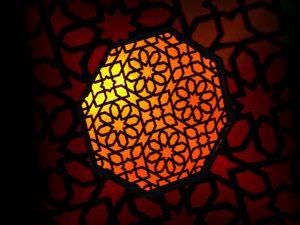“There’s only one corner of the universe you can be certain of improving, and that’s your own self,” wrote Aldous Huxley, the English novelist best known for his dystopian novel, Brave New World. In his exploration of the dilemmas confronting twentieth century man – the rise of capitalism, the dehumanising demands of technology and progress, the worship of consumerism, the culture of instant gratification – Huxley hits on many truisms in his chilling forecasts to the modern world. At the heart of Huxley’s critique of modernity is his notion of the “revaluation of values:” that the modern world was radically altering established norms and standards for the worse. He envisioned that as the world gets more technologically savvy, it would begin to lose its human face. Many have since argued that the Huxlian nightmare is not so very distant.
The Crescent is Coming
This week will see Muslims the world over commence Ramadan, the month of fasting. Ramadan, essentially, is the month in which the faithful are required to buckle down more consciously and improve their own “corner of the universe.” The month is characterized by heightened religious observance and a keener sense of social cohesion, and provides a powerful energy for transformation. As the month progresses, many Muslims, repentant for the ills and misdeeds of their past, resolve never to return to such ways again. “Thus,” says Shalabi, “men, women, and whole societies purify themselves during this month that becomes the turning point of the year; and, for many people, it is the turning point of their lives.” [1]
Keep supporting MuslimMatters for the sake of Allah
Alhamdulillah, we're at over 850 supporters. Help us get to 900 supporters this month. All it takes is a small gift from a reader like you to keep us going, for just $2 / month.
The Prophet (SAW) has taught us the best of deeds are those that done consistently, even if they are small.
Click here to support MuslimMatters with a monthly donation of $2 per month. Set it and collect blessings from Allah (swt) for the khayr you're supporting without thinking about it.
Ramadan, or more precisely, the act of fasting, yields to the faithful an array of timely lessons to help steer them through what is fast becoming a volatile and vulnerable world.
Undoubtedly, the core lesson of Ramadan is bound with the Quranic dictum: O you who believe! Fasting is prescribed for you, as it was prescribed for those before you; that you will perhaps be God-fearing.[2] Key to this notion of a God-fearing life is the idea of tazim: reverence. In this Age of Irreverence, Ramadan is a call to renew our reverence and love of God by venerating the Divine commands and respecting their limits. The regime of fasting sets certain limits which, though designed to facilitate our detachment from dunya; the material world, and also from the nafs, or ego, is ultimately about according the believer an opportunity to revere and remember God more fully and faithfully.
This brings to the fore another aspect of Ramadan, often obscured to many Muslims. The act of fasting, as given in the Qur’an, is a reminder that ours is an ancient way of living. For fasting is prescribed for you, as it was prescribed for those before you. In other words, Islam calls to a way of life which, essentially, is traditional; pre-modern. It stands in stark contrast to the call of modernity, with its irreverence, individualism and cult of conspicuous consumption. This is not to suggest that Muslims are required to be luddites or anti-technology. A Muslim women donned in a hijab, using a mobile phone; or a bearded brother drinking “bepsi” or carrying bluetooth technology, are not in themselves contradictions in terms. But for believers, explains Gai Eaton, there is only one litmus test to really assess the worth of technology and progress: “Does it promote piety – awareness of the divine Presence – or diminish it? Does it lead an increasing number of men and women to the gates of Paradise or does it encourage them to stray from ‘God’s Path’? Does it reinforce the divinely revealed Law or does it blur the distinction between what is commanded and what is forbidden? There are, of course, other considerations but they must take a lower place in a fixed order of priorities. An increase in life expectancy is, obviously, a good thing, but it is worthless if these additional years do not lead to an increasing awareness of the divine Reality which we are soon to meet. There is nothing inherently wrong with the comforts provided by the modern world … but these count for nothing if their soft embrace encourages us to forget our origin and our end.”[3]
Putting a Lid on the Self
Another of Ramadan’s recurring themes is that of restraint. By temporarily denying themselves instant gratification while fasting, the faithful are taught self-restraint. Here again we confront Islam (and other traditional religions) as counter-culture. For what could be more unmodern than to keep the demands and cravings of the nafs; the lower self, in check. Modernity is about pandering to the nafs. “Free yourself”, “Be yourself”, “Indulge yourself”, is modernity’s holy trinity. Yet the Qur’an is not completely hostile to consumerism, for it insists: O you who believe! Eat of the good things which We have provided for you, and be grateful to God, if it is He whom you worship.[4] It also strictures: “Eat and drink of that which We have provided you, and do not make mischief in the earth.”[5] There is also the verse which exhorts: “But seek the abode of the Hereafter in that which God has given you, and forget not your portion of the world, and be kind even as God has been kind to you, and seek not corruption in the earth; for God loves not corrupters.”[6]
We also encounter self-restraint in the following words of the Prophet, peace be upon him: “On a day when one of you is fasting, he must not indulge in obscene language, nor shout; and if someone insults him or starts to argue with him, he should simply say: I am fasting.”[7] Our current climate is one in which Muslims and their faith are now under constant scrutiny, criticism and attack. Hardly a day goes by, in the media or the world at large, without Islam being fair game in one way or another. It was around about this time last year that the Pope served up his pitiful and ill-informed portrayal of Islam. Within a fortnight of Ramadan starting, Jack Straw sparked-off the provocative, though perhaps understandable, debate about the face veil, or niqab. In both instances, there was plenty for Muslims to stomach whilst they fasted. Yet for believers, the self-restraint exercised in Ramadan is the very same restraint we must demonstrate in the face of all such provocations. The Qur’an says: You shall certainly hear much that is hurtful from those who were given the Book before you, and from the idolaters. But if you patiently persevere and fear [God], these are weighty factors in all affairs.[8]
But not all that is hurtful is necessarily harmful. Criticism can oftentimes be profoundly threatening, but it can also be positively challenging. Faith would indeed be fragile if it were not open to scrutiny or criticism; and in a secular society we should expect nothing less. Yet if the niqab conundrum teaches us anything, it is that fostering harmony in society is unlikely to be advanced by stifling a woman’s right to wear a face veil, or a cross for that matter: if she so chooses. Instead, peaceful coexistence means living together with those who have a different faith narrative, or worldview, in the spirit of mutual respect and tolerance.
Reclaiming Responsibility
Ramadan reminds us of our responsibility to God and the good. The month is ultimately about salvation and about being enveloped by divine forgiveness. Nowhere is this better demonstrated than in the prayer Muslims utter during what Islam deems to be the holiest night of the year: laylat al-qadr – “The Night of Eminence.” Here, believers can be heard earnestly entreating: “O God! You are the Effacer of Sins, You love to efface sins; efface my sins.”[9]
Ramadan further reminds us of our responsibilities to the world’s poor and hungry. For by the end of a day’s fast, Muslims usually experience some sensation of hunger. Thus we are awakened, in a most direct manner, to the plight of hundreds of millions of our fellow human beings who suffer hunger and starvation every day. This should compel us to extend to them our help and support. In a world filled with grotesque human inequalities, and soaked in the unholiness of poverty, we must each commit ourselves to eliminating this global indignity.
As with other issues, the veil debate also compelled us to examine the issue of responsibility. Was it, for example, responsible for politicians to wade into the niqab debate, or should they have exhibited some sense of secular impartiality? How responsible is it to impose restrictions on Muslim women wearing the veil from getting fair and equal access to their elected representatives, or to institutions of the state? If a majority find the dress code of a minority discomfiting, or a barrier to integration, where does the responsibility of understanding and acceptance lie? Is there a responsibility on Muslim scholars to reevaluate the wisdom of wearing the veil in Britain? Do Muslims have a responsibility to take into consideration the cultural sensitivities of the British public with respect to overt religious practices? Then there is the question of the media\’s responsibility: ever eager to sensationalize and be alarmist. And finally, of course, there is the issue of Muslim responsibility vis-a-via their perceived lack of integration into mainstream British society.[10]
As for a more meaningful integration of Britain’s 1.8 million Muslims into wider British society, this is the challenge that awaits us now. Yet the question of integration cannot be reduced to how much or not we declare ourselves to be British. For we are not desperately seeking to be British Muslims as much as we are trying to be conscientious believers and responsible citizens.
This year, schools began the academic year a few weeks before Muslims will commence their month of fasting. As schools all over Britain embark on the task of grounding students in the three R’s (reading, writing and arithmetic), Ramadan, it would seem, offers its own set of three R’s: reverence, restraint and responsibility.
Notes
- Islam: Religion of Life (USA: Starlatch Press, 2001) p.72
- Qur’an 2:186.
- Remembrance of God: Reflections on Islam (Cambridge: The Islamic Texts Society, 2000), pp.25-6.
- Qur’an 2:172
- ibid., 2:60.
- ibid., 28:77.
- Al-Bukhari, no.1905; Muslim, no.1151.
- Qur’an 3:186.
- Al-Tirmidhi, Sunan, no.3508.
- Cf. Yahya Birt, The Veil and the Limits of English Tolerance, accessible at www.yahyabirt.com/?p=36























Pingback: MMTreasures | The Three R’s of Ramadan - MuslimMatters.org
Pingback: MMTreasures | The Three R’s of Ramadan | Peachy Parenting
Aisha Mahmood
August 22, 2012 at 2:17 PM
Great to see Abu Aaliyah back on Muslim Matters. Please can we have some more. He has an excellent new blog thehumblei.com Excellent article, a lot to ponder over and apply even now that ramadan is over.